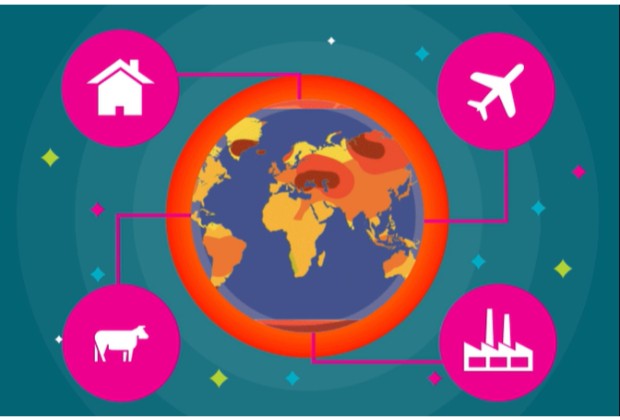Steps towards climate change. With so many experts on climate change, many people ask what they personally can do about it. And how does this fit into the bigger picture? We did a lot of reading up and found this article by The Grantham Institute to be very informative and easy to read & apply. 1. Make your voice heard by those in power Tell your Member of Parliament, local councilors, and city mayors that you think action on climate change is important. A prosperous future for the United Kingdom depends on its decisions about the environment, green spaces, roads, cycling infrastructure, waste and recycling, air quality, and energy-efficient homes. Ultimately, steps to reduce carbon emissions will have a positive impact on other local issues, like improving air quality and public health, creating jobs, and reducing inequality. 2. Eat less meat and dairy Avoiding meat and dairy products is one of the biggest ways to reduce your environmental impact on the planet. Studies suggest that a high-fibre, plant-based diet is also better for your health - so it can be a win-win. If impossible to cut out meat altogether, try to eat fewer or smaller portions of meat, especially red meat, which has the largest environmental impact, and reduce dairy products or switch them for non-dairy alternatives . Try to choose fresh, seasonal produce that is grown locally to help reduce the carbon emissions from transportation, preservation and prolonged refrigeration. 3. Cut back on flying We live in Mauritius, so this is quite a tough one for us :) But here is a 'knowledge is power' moment: If you need to fly for work, consider using video-conferencing instead. For trips in the same country or continent, take the train or explore options using an electric car. When flying is unavoidable, pay a little extra for carbon offsetting. There are a variety of reputable carbon offsetting schemes that fund sustainable development projects or natural solutions like planting trees. 4. Leave the car at home Instead of getting in the car, walk or cycle – and enjoy the physical and mental health benefits, and the money saved. For longer journeys, use public transport, or try car sharing schemes. Not only do cars contribute to greenhouse gas emissions, but air pollution caused by exhaust fumes from traffic poses a serious threat to public health. It has been shown to affect the health of unborn babies and increase the risk of dementia. Furthermore, Imperial research shows that poor air quality in the capital leads to around 1,000 London hospital admissions for asthma and serious lung conditions every year, and that air pollution in the United States is associated with 30,000 deaths and reduced life expectancy. 5. Reduce your energy use, and bills Small changes to your behaviour at home will help you use less energy, cutting your carbon footprint and your energy bills: Put on an extra layer and turn down the heating a degree or two. Or in Summer, open windows so you don't need an aircon. Turn off lights and appliances when you don’t need them. Replace light bulbs with LEDs or other low-energy lights. Make simple changes to how you use hot water, like buying a water-efficient shower head. Go further Make sure your home is energy efficient. Check the building has proper insulation, and consider draught-proofing windows and doors. If you are in rented accommodation, lobby your landlord to make sure the property is energy efficient. Switching energy supply to a green tariff is a great way to invest in renewable energy sources – and could save you money on bills too. 6. Respect and protect green spaces Green spaces, such as parks and gardens, are important. They absorb carbon dioxide and are associated with lower levels of air pollution. Regulates temperature by cooling overheated urban areas, can reduce flood risk by absorbing surface rainwater and can provide important habitats for a wide variety of insects, animals, birds and amphibians. They also provide multiple benefits to public health, with studies linking green space to reduced levels of stress. What can I do? Plant trees. The Woodland Trust are aiming to plant 64 million trees over the next 10 years – and need your help. Whether you want to plant a single tree in your garden, or a whole wood, they have tools and resources to help. Create your own green space. Add pot plants to your window sill or balcony, and if you have your own outdoor space, don't replace the grass with paving or artificial turf. Help to protect and conserve green spaces like local parks, ponds or community gardens. 7. Invest your money responsibly Find out where your money goes. Voice your concerns about responsible investment by writing to your bank or pension provider, and ask if you can opt out of funds investing in fossil fuels. There are also a number of ‘ethical banks’ you can investigate. Find more steps towards climate change Banks, pension funds, and big corporates often hold investments in fossil fuel companies. However, the discussion around responsible investment – weighing up environmental, social, and governance (ESG) factors and taking them into consideration when investing money – is growing. 8. Cut consumption – and waste Everything we use as consumers has a carbon footprint. Avoid single-use items and fast fashion, and try not to buy more than you need. Shop around for second-hand or quality items that last a long time. Put your purchasing power to good use by choosing brands that align with your new green aspirations. Try to minimize waste Repair and reuse. Give unwanted items a new life by donating them to charity or selling them on. Avoid wasting food. Let brands know if you think they are using too much packaging – some will take customer feedback seriously. 9. Talk about the changes you make Conversations are a great way to spread big ideas. At EcoMauritius.mu, we call this 'Sharing is Caring :) As you make these positive changes to reduce your environmental impact, share your experience with your family, friends, customers, and clients. Don’t be a bore or confrontational. Instead, talk positively, and be honest about the ups and downs. If you would like to learn more, you can access this wonderful site: https://www.imperial.ac.uk/grantham/
Read More



